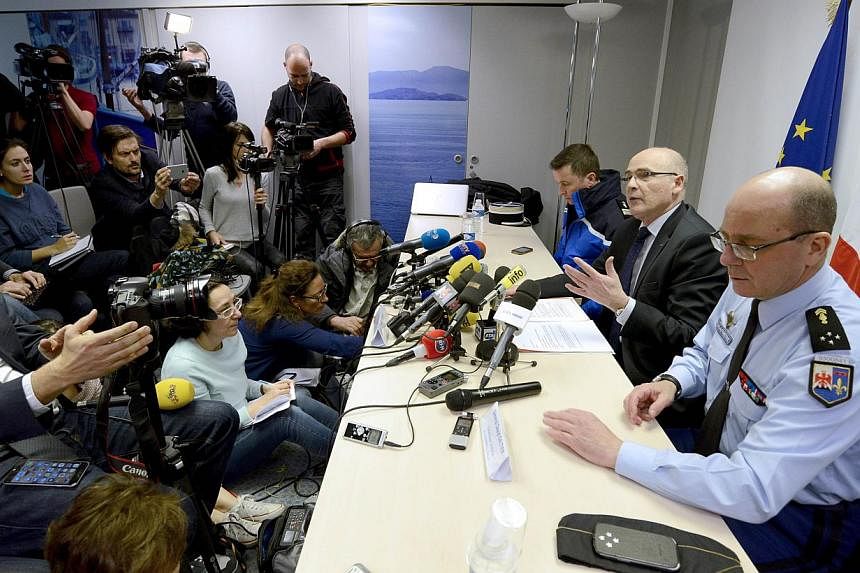MARIGNANE, France (AFP/REUTERS) - The co-pilot "voluntarily" initiated the descent of the Germanwings flight 4U9525 that crashed into the French Alps and refused to open the door to the pilot who was outside the cockpit, the lead investigator said on Thursday.
"The co-pilot is alone at the controls," said prosecutor Brice Robin, recounting information gathered from the "black box" recorder. "He voluntarily refused to open the door of the cockpit to the pilot and voluntarily began the descent of the plane."
The co-pilot seemed to "show a desire to want to destroy" the plane, the lead investigator said.
He was named as Andreas Lubitz, 28, and was a German citizen who was "not known by us" to have any links to terrorism or extremists, Mr Robin told reporters, adding that the German authorities were expected to provide additional information on his background and private life later on Thursday or Friday.
"There is no reason to suspect a terrorist attack," he added.
The recording showed that the pilot and co-pilot talked normally and "courteously" for the first 20 minutes of the flight after it took off from Barcelona.
"Then we hear the pilot ask the co-pilot to take the controls and a seat being pulled back and a door closing. We can assume he left to answer nature's call," said Mr Robin.
"The co-pilot is left alone at the controls. We hear several calls from the pilot asking for entry into the cockpit. There is no response from the co-pilot."
Mr Robin said there were "normal" breathing sounds from Lubitz throughout the rest of the flight that indicated he was conscious.
Lubitz, left in sole control of the Airbus, pressed a button that sent the jet into its fatal descent, the prosecutor told the news conference carried on "live" television.
He turned the "flight monitoring system" button to initiate the plane's descent and spoke "not a single word" during the last 10 minutes before the plane crashed.
The co-pilot, who deliberately set the controls "to accelerate the plane's descent" into the side of a mountain in a region famous for its ski resorts, "was conscious until the moment of impact", Mr Robin said.
"This action can only be deliberate. It would be impossible to turn the button by mistake. If you passed out and leaned over on it, it would only go a quarter-turn and do nothing," he stressed.
"He didn't reply to a thing. He didn't say a word. In the cockpit, it was utter silence."
Asked whether he believed the crash that killed 150 people was the result of suicide, he said: "People who commit suicide usually do so alone... I don't call it a suicide."
"Suicide" was also the wrong word to describe actions which killed so many other people, the prosecutor added: "I don't necessarily call it suicide when you have responsibility for 100 or so lives."
Mr Robin said the black-box cockpit recording recovered from the wreckage of the disaster suggested passengers did not realise what was happening "until the last moment" as "cries are not heard until the end".
The 150 people on board died "instantly", he told reporters and were "unaware" of the crash until the final seconds of the crash.
Mr Robin said the conversation between the two pilots started off normally but that Lubitz's replies became "laconic" as his captain started readying what would have been the normal descent to the airport of Duesseldorf. "His responses become very brief. There is no proper exchange as such," he said.
Mr Robin said the family of the co-pilot had arrived in France for a tribute alongside other those of the victims but was being kept apart from the others.
The New York Times cited an unnamed investigator as saying the recording shed insight into the moment when it dawned on the captain that he had been shut out of the cockpit.
"The guy outside is knocking lightly on the door and there is no answer," it quoted an investigator described as a senior French military official as saying. "And then he hits the door stronger and no answer. There is never an answer."
"You can hear he is trying to smash the door down," the investigator added.
Investigators were still searching for the second of the two black boxes on Thursday in the ravine where the plane crashed, 100km from Nice, which would contain data from the plane's instruments.
France's BEA air investigation bureau had said on Wednesday it expected the first basic analysis of the voice recordings in days.
Pilots may temporarily leave the cockpit at certain times and in certain circumstances, such as while the aircraft is cruising, according to German aviation law.
Lufthansa said that its cockpit doors can be opened from the outside with a code, in line with regulations introduced after the Sept 11, 2001 attacks in the United States. However, the code system can be blocked from inside the cockpit, according to an Airbus promotional video posted online and confirmed by the planemaker.
The BEA on Wednesday already ruled out a mid-air explosion and said the scenario did not look like a depressurisation.
Germanwings said 72 Germans were killed in the first major air passenger disaster on French soil since the 2000 Concorde accident just outside Paris. Madrid revised down on Thursday the number of Spanish victims to 50 from 51 previously.
As well as Germans and Spaniards, victims included three Americans, a Moroccan and citizens of Britain, Argentina, Australia, Belgium, Colombia, Denmark, Israel, Japan, Mexico, Iran and the Netherlands, officials said. However, DNA checks to identify them could take weeks, the French government said.
The families of victims were being flown to Marseille on Thursday before being taken up to the zone close to the crash site. Chapels had been prepared for them with a view of the mountain where their loved ones died.

